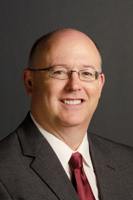

(Editor's Note: This is the second in a series on spiritual fitness or growing in godliness. For the first part, please see HERE.)
Just a couple of months ago we introduced the Lord’s Prayer as a part of the bedtime ritual for the boys who are two and four now. God has powerfully blessed us since doing so.
However, I have learned that R.C. Sproul’s statement about the sections of the Bible with the Lord's Prayer as being “the most neglected passages in the New Testament” had been more true in my life than it should have.
(Each slice of his ten-part series on the Lord’s Prayer lasts about 22 minutes, and after listening to more than an hour, it is as if I’ve tasted some of the sweetest fruit to nourish the soul – particularly in the section “Thy Will Be Done.” I had started this blog before discovering these, yet already I am greatly moved by them.)
Anyone who denies prayer as part of being spiritually fit or being fit for the kingdom hasn’t paid attention to how often Jesus prayed in the New Testament nor with how often prayers are packed within the Bible.
The Request
Scripture doesn’t tell us which disciple asked Jesus to teach them to pray because it was actually a request.
“Lord, teach us to pray, just as John taught his disciples” (Luke 11:1 NKJV).
What didn’t Jesus teach?
He didn’t say pray what is on your heart.
He didn’t say just pray whatever comes to mind.
He didn’t teach a prayer focused purely on the person praying and his or her requests.
Do all of these seem in opposition to how prayers occur in American Christianity?
If so, you aren’t the only one. “I think we are in the most narcissistic age in the history of the church,” Sproul said, “where all the attention is on ourselves rather than on the majesty of God.”
What did Jesus teach?
First, He gave some things to avoid.
We shouldn’t treasure being seen or heard by others (Matthew 6:5). Those who do this have fallen in love with a method instead of the Master. Matthew 6:6 says we should pray privately and in secret. Then, Matthew 6:7 says we shouldn’t pray with vain repetitions with many words.
Well, this presented some problems for me. I originally learned this prayer while attending church as a child. It was publicly prayed and in unison as part of the service.
However, I noticed something that eased my concerns after I prayed to God while honoring what James 1:5-6 says.
The prayer starts with “Our.” This could possibly indicate we would be praying with others, and/or we are to remember we are part of a family who has God as their Father. Remember, the request was to “teach us to pray.” When my wife and I pray this prayer together as the boys listen, I know God is working on each of us individually and us together.
Glory to God
Jesus created this prayer to glorify God. This rose must smell as sweet to God regardless of the name we give it if we just pray it: the Lord’s Prayer, the Our Father or the Pater Noster – Latin for “Our Father” (as dubbed by many Catholics), or the disciple’s prayer (as dubbed by some evangelicals).
In a previous blog, “The God Who Answers Prayer,” I shared that I cringe a little when I hear or read “I believe in the power of prayer.” Why? It steals glory from God in a culture with many mini-gods. So, let’s give glory where glory is due – to the God who answers prayers and the God who cares.
Even though our requests are sandwiched between parts that glorify God, we see Jesus reminding us of something we all need to know just before starting – especially if we think this prayer is too general in nature to our requests:
“Therefore do not be like them. For your Father knows the things you have need of before you ask Him” (Matthew 6:8 NKJV).
Yet, Jesus made sure to include our requests for the most necessary needs between the parts many don’t know we need – to glorify God.
Praying God’s Word
Interestingly, Jesus also didn’t teach them to pray Scripture either – one of the most powerful ways to pray to God. It wasn’t that Jesus didn’t have examples.
Sproul points out He could have told them to study the Psalms. They are anthems and prayers led by the Holy Spirit. Sproul adds how history proves the Psalms have often been the heart and center of church liturgy when the church has flourished. Lord, please flourish your church today.
Yet, the Lord’s Prayer is Scripture for us today, isn’t it? Let that one soak in for a while.
The Lord’s Prayer is Scripture – God’s Word doing God’s work. It is living and active. It penetrates and exposes our innermost thoughts, intentions, and desires (Hebrews 4:12).
So, even when I was exhausted and frustrated from an extremely long day, regularly praying this affected me more than I want to admit. Yet, to fail to do so would be to withhold glory from God.
Please realize, the Lord’s Prayer isn’t some weight set where we can do so many sets and repetitions each week to gain spiritual fitness. This isn’t checklist Christianity. This is a family we’ve been adopted into or grafted into where God is our Father. We should love Him because He first loved us.
Reflecting on God’s glory humbled me. Recognizing the sins against me that I had not forgiven shamed me and made me ask for His strength in my heart to obey (Philippians 2:13 NLT).
Additionally, and I have to agree, Sproul described the “forgive us our sins as we have been forgiven” portion as the most terrifying part of the Lord’s Prayer. Think about this:
Do you want God to proportionately withhold forgiveness from you as you do others?
Glorifying God despite the pain
Ray Pritchard of Keep Believing Ministries wrote a beautiful piece called “If God is Good, Why Do I Hurt?”
He addresses the question we may even be afraid to ask ourselves at the lowest points in life: "Is God good, and can He be trusted to do what is right?” I found Sproul’s discussion of “Thy Will Be Done” to be very useful here too.
Does this seem to fly in the face of what Jesus said, “…For your Father knows the things you have need of before you ask Him” from Matthew 6:8 (NKJV)?
No, instead it points out a place where we can trust God more. These times also point to the part of the prayer we may misunderstand – the part about “lead us not into temptation, but deliver us from evil.”
Sproul describes this by delving into the Greek meanings of the word(s) and touching on how this also uses a literary technique often found in the Old Testament – parallelism. This is where the meaning is nearly the same but with different words.
It seems the Greek word for temptation is better translated as “test.” This better lines up with Scripture saying God doesn’t tempt us (James 1:13).
The Greek word used for evil here – peirasmos – is the male gender as shown by the ending. Some translations clearly show we aren’t talking about an abstract evil – which would have a different ending. Those read “deliver us from the evil one.”
The gist of it is we are praying for God not to test us, but if we are tested, then we are praying He would be our shield, our protector. Many, including Jesus, faced tests, so for us to not expect them is to ignore reality.
Pritchard shares one man’s multi-year battle with cancer where many had prayed for his complete healing. The man began “...pondering his own situation from a new perspective. Which is the greater miracle, he wondered, to be healed from cancer or to be given the grace to stay faithful even if he isn’t healed completely?”
Job reprimanded His friends and wife while simultaneously glorifying God when he said, “Though He slay me, yet I will trust in Him” (Job 13:15a). Pritchard's writing expands on the purpose of testing by explaining the three sections found in this verse:
But He knows the way that I take; When He has tested me, I shall come forth as gold (Job 23:10 NKJV).
This type of trust confuses the world, but it powerfully glorifies God.
“For thine...”
Within a month of us adding the Lord's Prayer to our evening, God surprised us. Already He had been working on my wife and me in relation to Him and those around us. Imagine our joy when, even as he was playing alone, the oldest spontaneously and clearly said “for thine is the kingdom, and the power, and the glory forever. Amen.”
He isn’t going to let a rock out praise him! Are you?
Let’s give glory to our Father God who answers prayer because He is also the God who cares.

